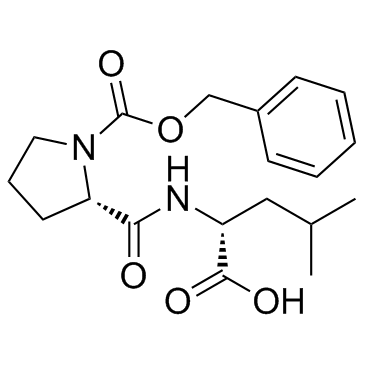| In Vitro |
The addition of specific dipeptide containing branched-chain amino acids, such as Prolylleucine, to the growth medium negatively affects cell envelope-associated proteinase (CEP) activity, whereas dipeptides without branched-chain amino acids had no effect on the enzyme's production. To determine if certain peptides are involved in the regulation of CEP biosynthesis, eight specific dipeptides, one tripeptide, and two peptide fractions (LMMP and HMMP) from Casitone are evaluated. The CEP activity levels of L. delbrueckii subsp. lactis CRL 581 grown in MDM supplemented with LMMP are similar to those obtained in cells grown in minimal defined medium (MDM) supplemented with Casitone (99-fold reduction). The addition of leucylglycylglycine (LGG), leucylleucine (LL), leucylproline (LP), or Prolylleucine (PL) (final concentration, 1 mM) to MDM leads to a 6.5-, 7-, 4-, or 3.5-fold reduction in CEP activity, respectively. An increase of up to 5 mM in the concentration of these dipeptides results in a further two- or threefold reduction of CEP activity compared to the activity obtained in the presence of 1 mM of the peptide mentioned above. LGG, LL, LP, and Prolylleucine contain leucine as a branched-chain amino acid (BCAA). In contrast, no effect on CEP activity is observed by the supplementation of MDM with 1 to 5 mM of GT, PA, TG, GM, GP (dipeptides without BCAA), or HMMP. No inhibitory effect on proteinase activity from the presence of high concentrations (10-fold increase) of each of the 20 amino acids in the growth medium is observed. However, a 50-fold increase in BCAA concentration in MDM leads to a repression of proteinase synthesis of 40%. L. delbrueckii subsp. lactis is auxotrophic for BCAA[1].
|
